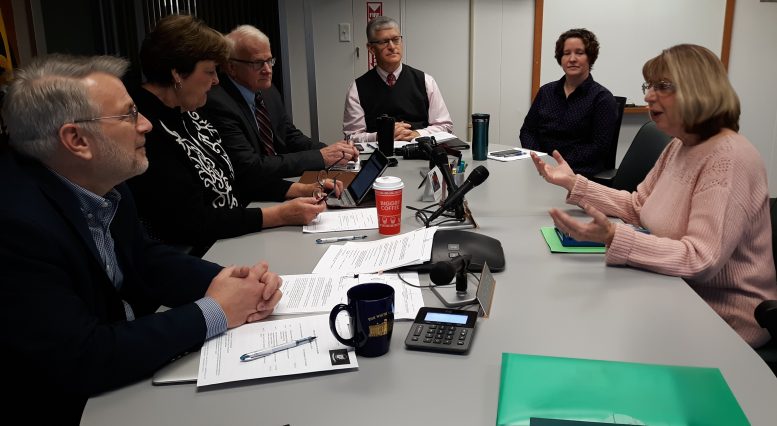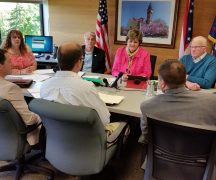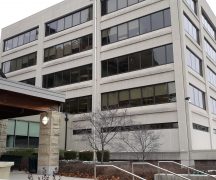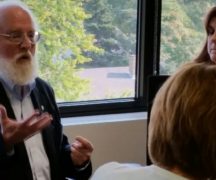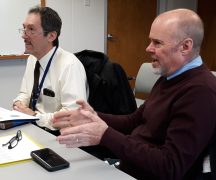By JAN LARSON McLAUGHLIN
BG Independent News
Across the country, the National Day of Prayer invites people of all faiths to pray for the nation.
But not in Bowling Green.
Here, only Christians can pray.
About a month ago, the Wood County Commissioners sent a letter to Kristel Asmus, who has organized the annual National Day of Prayer on the steps of the county courthouse for 20 years.
The letter expressed the commissioners’ concerns about area residents who feel the local prayer observance fails to include all faiths. On Tuesday, the commissioners met with Asmus to discuss their wishes that the event be more inclusive and less divisive.
But Asmus was unwilling budge. Others are welcome to attend, but not participate in prayer.
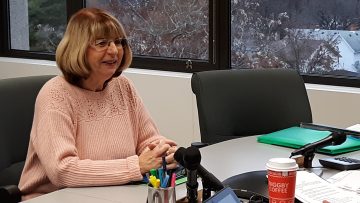
Kristel Asmus
“Just so you know, I’m not changing,” she told the commissioners.
That puts the local National Day of Prayer event at odds with most others around the nation – and at odds with the original intention for the day.
The annual observance, held on the first Thursday of May from noon to 1 p.m., was created in 1952 by a joint resolution of the United States Congress, and signed into law by President Harry Truman. The National Day of Prayer invited people of all faiths to pray for the nation.
However, a privately-funded “task force” was created later to “mobilize the Christian community to intercede for America’s leaders and its families.” The task force’s logic was that since America was “birthed in prayer and in reverence for the God of the Bible,” then only Christian prayers were welcome.
In Bowling Green, the event continued as usual until a leader of the local Mormon church became head of the Bowling Green Ministerial Association.
Asmus, who coordinates the annual gathering, said he was not allowed to pray at the event.
“We believe in the total Bible,” she told the commissioners. “The Mormon belief is not Christian.”
Asmus, who represents Dayspring Assembly of God in the ministerial association, said she sought confirmation from the National Day of Prayer Task Force. She presented the commissioners with the reply from the group, concurring with her decision. The letter stated that Mormons could not participate in leadership teams or participate publicly in the prayer event.
“They do not believe what we believe,” she said. “I could not invite them to participate.”
“That started this whole thing,” Asmus said to the county commissioners.
Some churches, she said, want all faiths to be included. But she continues to refuse.
“I cannot invite a Muslim to pray to Allah. I’m sorry, I can’t do that,” she said.
The purpose of the day is for Christians to pray for the nation and its leaders.
“The Mormons can come to be part of the audience,” she added. “But to come to the podium and pray, I want them to believe in God.”
Asmus also presented the commissioners with a commitment form from the National Day of Prayer Task Force, that she requires all participants to sign. The form requires a lengthy statement of faith.
“I’m going to stand by this. I’m not going to change,” she said. “I’m just going to invite the Christian churches to pray.”
Commissioner Ted Bowlus asked Asmus about her unwillingness to include others.
“My understanding is, Mormons follow the Bible,” Bowlus said.
“They say they do, but they really don’t,” Asmus replied, listing off some differences in doctrines. “They’re not on board with us.”
Then Bowlus took it further.
“What would Jesus do,” he asked. “Would he exclude all religions that don’t believe in him? I don’t think so.”
Asmus responded with the story of Jesus cleansing the temple, driving out the merchants and money changers.
Wood County Administrator Andrew Kalmar pointed out that the original National Day of Prayer was not created for Christians only.
“It welcomes people of all religions because that’s what makes us the United States,” he said. “They know God in their religion.”
To which Asmus replied that people of all faiths may attend, “but they can’t say a word.”
Commissioner Craig LaHote agreed that a more inclusive event would be fitting.
“It’s not the National Day of Christian Prayer,” LaHote said.
“But I’d like to keep it a Christian event,” Asmus responded.
Besides, she said, the Bowling Green Ministerial Association has since created an annual Interfaith Breakfast held each spring for people of all faiths.
“They have a breakfast now that anyone can come to,” she said.
Asmus said the prayer event on the courthouse steps is intended to provide guidance to the government.
“I will still invite people in the government to come. I want them to have the wisdom to run the country,” she said.
Bowlus asked Asmus to reconsider.
“By definition what you’re doing is dividing people,” he said.
Asmus said she is accustomed to the persecution aimed at Christians. “We stand up for what’s true.”
But Bowlus asked, “Are you persecuting the Mormons? Are you persecuting the Muslims?”
“I love the Mormons. I love everybody,” Asmus said.
“I say if you love them, let them pray,” Bowlus said.
“I guess we don’t agree,” Asmus said. “I just want to make this a Christian event. I’m not going to back down.”
Commissioner Doris Herringshaw cautioned Asmus.
“You have to remember, we as government represent everybody,” Herringshaw said. “I think we all have our own ideas about religion.”
But the commissioners have to allow anyone to assemble on the courthouse yard, Kalmar said. By law, the commissioners have had to allow the KKK to hold rallies in front of the courthouse.
“It’s public property. As long as you’re not disrupting public business,” he said.
The commissioners aren’t alone in their distaste for the narrow interpretation of the event. Bowling Green Mayor Dick Edwards has expressed his concerns to Asmus in the past.
“It’s totally out of sync with the national standards,” Edwards said. “We are elected to represent all the people.”
The mayor said he has talked with and written to Asmus asking her to be more inclusive – like many Christians in the community.
“In my faith, I honor all faiths,” Edwards said. “I have learned to be respectful of the beliefs of others.”
The mayor has been unable to attend the prayer event the last two years.
“It really bothers me. We are a city of very diverse interests,” he said. “She doesn’t get it at all.”
Pastor Gary Saunders, of the First Presbyterian Church, and co-chair of the BG Ministerial Association, also has not attended the event in the last few years.
Saunders – who spoke on behalf of himself not the association – isn’t alone. “There are clergy who have quietly stepped back from the event,” he said.
The National Day of Prayer, Saunders said, was designed to be inclusive.
“It’s explicitly been for all people of faith to join in prayer for the country,” he said.
The privately-funded task force twisted the original intent of the day into the “Christian-only” message.
“That’s not understood very well,” Saunders said. “This is at odds with the true proclamation from the federal government.”
The well-funded task force sends out official looking materials that “seem to carry a national message,” but are just from that private organization, he added.
Some members of the local ministerial association wanted to change the local prayer event back to its original purpose.
“Several of us talked about broadening it,” Saunders said.
But that proved awkward, so instead the concept of the Interfaith Breakfast was born.
Saunders was glad the local interpretation of the prayer day was discussed at the county commissioners’ meeting, since he thinks many governmental officials aren’t aware of the divisive nature of the event as it is organized here.
“I’m very pleased it was put on the table. The community needs to know about it, and make informed decisions,” he said.

